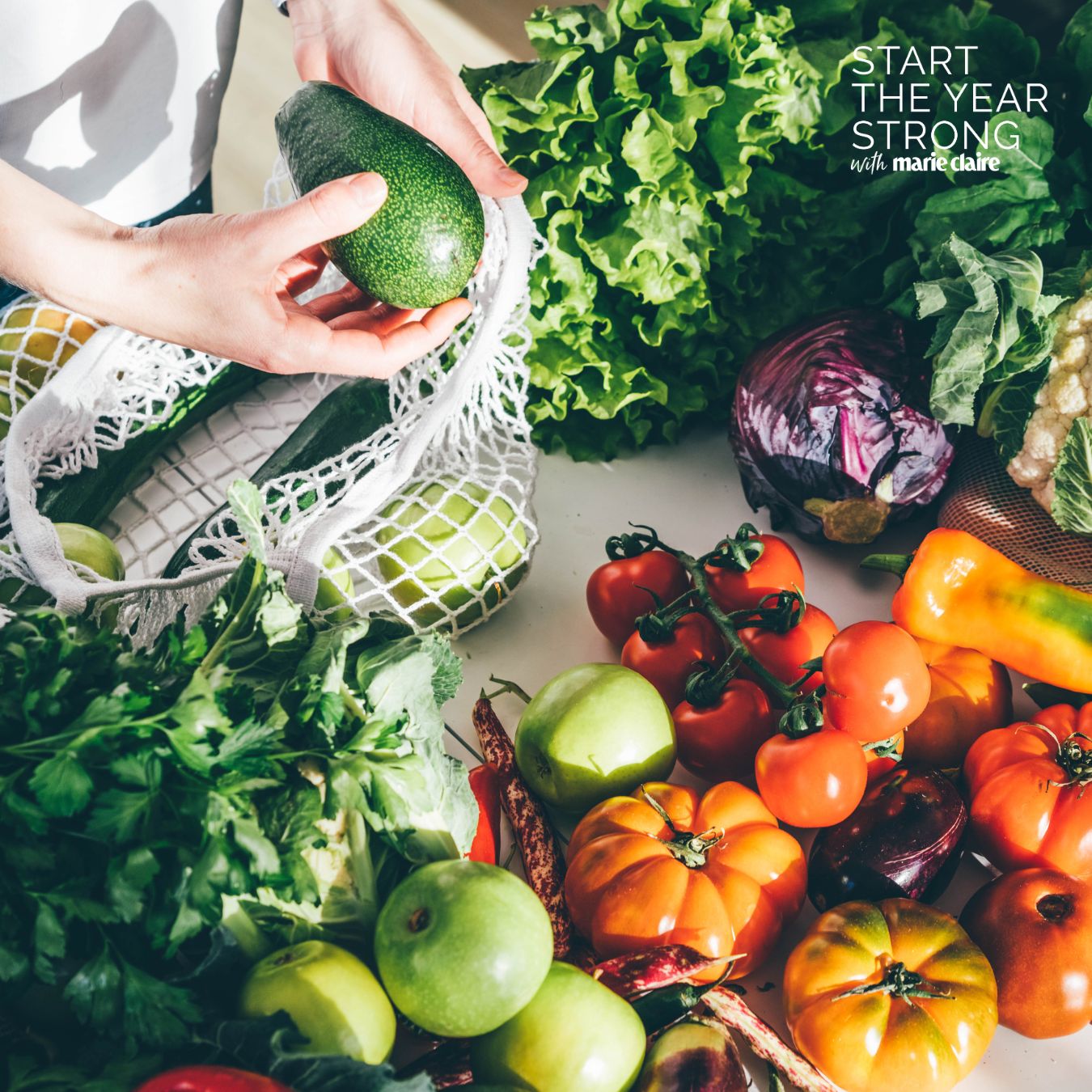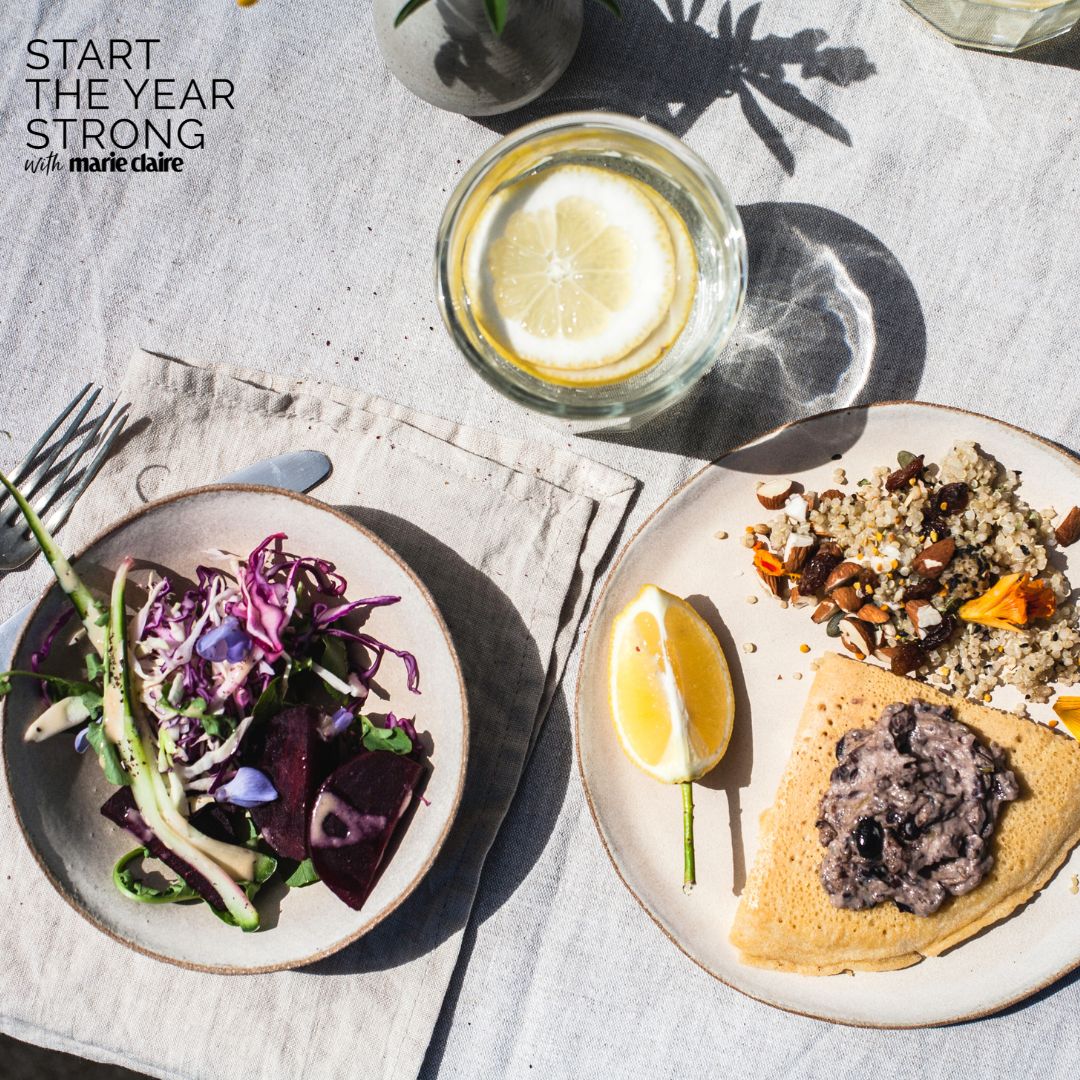A healthy gut is key to good mood, weight management and more - 8 signs that yours isn't in the best shape
It's known by scientists as the second brain for a reason.

You'll likely know all the tenets of what constitute "good" gut health - you know, a diverse, vegetable-rich diet supplemented with fermented foods and plenty of water. That said, you might not know what the most obvious unhealthy gut symptoms are, or how your health is likely to be impacted if your gut health isn't in very good shape.
Spoiler alert: it turns out your gut is pretty key for weight management, skin health, good mood and more, with scientists even calling it your second brain. Research has proven your gut has the ability to affect everything from heart health, to weight gain and maintenance, to mental health - so yep, it's really quite important.
To find out whether you have good gut health once and for all, keep scrolling. Our easy-to-digest, expert-led guide promises to educate you on the simplest ways to figure out if your gut health needs some work, but also how exactly to do that without breaking the bank.
We bought you the simplest gut health hacks to boost your wellbeing: next up, the most easy-to-spot unhealthy gut symptoms.
Unhealthy gut symptoms: 8 red flags
Unless you suffer from IBS, colitis, or Crohn’s disease, you probably don’t pay much attention to your gut - why would you? But FYI, the gut, or gastrointestinal tract – a tube that runs from the stomach to the bowel, via the intestines, forming the digestive system – is integral to your health.
"A weakened, damaged gut affects everything from our heart, brain, and immune system to our skin and how happy we feel," says doctor Vincent Pedre, a New York-based physician and author of Happy Gut. "It can lead to so much more than bloating and food intolerances."
Take a study from the University of Turku in Finland, for example, which found that eczema sufferers have slightly different gut bacteria to those who don’t have eczema. "The gut has a tissue layer that’s similar to that of skin, so if you’re experiencing imbalances in this layer, it will show on the skin’s surface," adds nutritionist and founder of Wild Nutrition, Henrietta Norton. "Similarly, if you’re not effectively absorbing the nutrients from your food because of low levels of beneficial bacteria in the gut, you may not be getting enough skin-nourishing vitamins."
Marie Claire Newsletter
Celebrity news, beauty, fashion advice, and fascinating features, delivered straight to your inbox!
Put simply, your gut health can impact everything from your skin, to your digestion, to your mental clarity and wellbeing.
So, how do you know if you have an unhealthy gut? Symptoms like frequent bloating, constipation, and tiredness are the most noteworthy, share the experts.
Sadly, most of us don’t even realise what a healthy gut feels like, according to nutritionist and author of Eat, Nourish, Glow, Amelia Freer. "Many people think it’s normal to wake up with a relatively flat stomach then gradually see and feel it expand throughout the day. But it’s not," says Freer. "A healthy gut means no daily bloating, gas, constipation, discomfort or tiredness after eating. You’ll also have better quality sleep, more energy, and fewer mood swings."
For your reference, any of the below could be signs of an unhealthy gut:
- Daily bloating
- Daily gas
- Daily constipation
- Daily discomfort after eating
- Daily tiredness after eating
- Poor quality sleep
- Low energy
- Mood swings.
Similarly, an unhealthy gut can become “hyper-permeable” or leaky, shares Pedre. "The gut sometimes becomes inflamed and mesh-like, so food particles get through to the bloodstream. Your body develops antibodies to fight them, and that’s where food intolerances come from," he explains.
What causes poor gut health?
Fun fact: our body is home to 100 trillion bacteria, and most of them live in the gut. There, imagine a constant tug of war between good and bad. The build-up of bad bacteria, caused by toxins in the food we eat, is neutralised by the friendly bacteria to keep our immune system stable.
"Anything that alters this delicate balance – such as chronic stress, poor diet, hormonal contraceptives, and antibiotics – can inhibit digestion," explains Freer. "This can cause bloating, discomfort, constipation, and diarrhea."
Another culprit can be anti-inflammatory drugs, such as ibuprofen.
15 best foods for gut health
A key player your diet, explains Pedre - so eating the right foods is important. It's not all leafy greens, leafy greens, leafy greens though - Doctor Simone Laubscher, founder of Rejuv Wellness, advises maintaining an 80/20 balance. "Try to eat more organic, whole foods where you can, but also enjoy the treats that are good for your soul, too," she advises.
Similarly, fermented foods such as sauerkraut, miso soup, and kombucha tea are great for gut health. "Eating small amounts of fermented foods daily is good for your gut health because fermentation makes the food easier to break down, and this protects the good bacteria," says nutritionist Vicki Edgson, author of Gut Gastronomy.
Great gut health foods include the following:
- Fruit
- Vegetables
- Organic meat
- Organic fish
- Eggs
- Legumes
- Beans
- Yoghurt
- Kefir
- Miso
- Sauerkraut
- Sourdough
- Kimchi
- Kombucha
- Garlic.
Can poor gut health impact your mental health?
Short answer: yes, it can. Bacteria don’t just dictate your digestive health, they’re crucial to your mood, too. There’s a reason why you feel butterflies in your stomach when you’re nervous or excited – it physically knots up in response to your emotions.
Did you know? The gut contains the second largest number of neuro cells, after the brain - hence the second brain thing. Inside your gut there’s a huge entity of bacteria that impacts your neuro cells, in turn influencing moods and emotional well-being.
One study from McMaster University in Canada even found that poor gut health equates to heightened anxiety and depression.
8 ways to improve your gut health
Follow the below steps, and don't miss our guide to gut health hacks, probiotics for women, what causes bloating, and foods to boost mood, while you're here.
1. Eat balanced meals and snacks
‘The gut is full of serotonin, aka your happiness hormone, and carbs are the quickest way to feed it," shares Pedre. "But this can result in an energy crash, so make sure you're eating a balanced meal or snack of carb, fat and protein for longer-lasting energy levels," he shares.
2. Drink more water
Sure, you've heard it before, but water really is the easiest and cheapest way to boost your gut health. Aim for two litres a day.
3. Try some yoga
Our guides to the types of yoga will come in handy here. While more research needs to be done on the matter, studies have found yoga may help relieve digestive issues. How? By decreasing stress, increasing circulation, and promoting gut motility, too.
4. Eat mindfully
Aka, chew thoroughly in order to slowly break food down. In turn, this will stimulate saliva production and aid digestion. "Fast stress-eating is bad for your gut," says Edgson.
Try this: breathe rhythmically to slow your eating right down.
5. Up your fibre
A study from Stanford University found friendly gut bacteria thrive on dietary fibre, and a lack of it weakens the gut lining.
Try this: up your intake of fruit, veg, grains, nuts, and seeds.
6. Try probiotics
Probiotics help restore balance in your gut. "Good-quality ones will survive the acidic environment of our stomach," explains Freer. Symprove was rated the most effective by UCL’s School of Pharmacy - read our Symprove review, here - or scroll our guide to the best probiotics for women.
7. De-stress
Easier said than done, right? If you're not sure where to start, going for a walk at lunch rather than sitting at your desk is simple yet effective.
8. Up those zzzzzs
Aim for six to eight hours of good quality sleep.
If you struggle to drop off try a calming tea before bed or invest in a pillow mist. Similarly, our guides to insomnia treatment and how to get to sleep might be useful.
What are the symptoms of bad gut bacteria?
As above, frequent stomach ache, discomfort, bloating, gas, constipation, tiredness after eating, low energy or poor quality sleep, share our experts.
Do note: if your symptoms persist for months on end, it's always worth booking a doctor's appointment to ensure your stomach issues aren't being caused by something else.
The simplest ways to improve your gut health include upping the amount of vegetables and fermented foods in your diet, drinking more water, and supplementing with probiotics.

Ally Head is Marie Claire UK's Senior Health and Sustainability Editor, nine-time marathoner, and Boston Qualifying runner. Day-to-day, she heads up all strategy for her pillars, working across commissioning, features, and e-commerce, reporting on the latest health updates, writing the must-read wellness content, and rounding up the genuinely sustainable and squat-proof gym leggings worth *adding to basket*. She also spearheads the brand's annual Women in Sport covers, interviewing and shooting the likes of Mary Earps, Millie Bright, Daryll Neita, and Lavaia Nielsen. She's won a BSME for her sustainability work, regularly hosts panels and presents for events like the Sustainability Awards, and is a stickler for a strong stat, too, seeing over nine million total impressions on the January 2023 Wellness Issue she oversaw. Follow Ally on Instagram for more or get in touch.
-
 Prince Harry reportedly extended an 'olive branch' to Kate and William on latest UK trip
Prince Harry reportedly extended an 'olive branch' to Kate and William on latest UK tripBig if true
By Iris Goldsztajn
-
 How Prime Video is protecting Blake Lively amid her new movie promo
How Prime Video is protecting Blake Lively amid her new movie promoAn understandable move
By Iris Goldsztajn
-
 It's the must-have bit of fit kit of the year - a fitness expert shares their top 5 tips for choosing a walking pad
It's the must-have bit of fit kit of the year - a fitness expert shares their top 5 tips for choosing a walking padThis year's fitness must-buy.
By Katie Sims
-
 I tried eating high protein breakfasts every day for seven days - and my energy and hunger levels have never felt so balanced
I tried eating high protein breakfasts every day for seven days - and my energy and hunger levels have never felt so balancedKickstart your day with a high protein feast.
By Anna Bartter
-
 Wondering whether you should take probiotics? As a world-leading gut health scientist, you might be surprised by my take
Wondering whether you should take probiotics? As a world-leading gut health scientist, you might be surprised by my takeIn an MC UK exclusive, we deep dive into the latest research.
By Dr Megan Rossi
-
 Your mouth-gut axis is way more important than you think – how poor oral hygiene can impact your health
Your mouth-gut axis is way more important than you think – how poor oral hygiene can impact your healthThis one's worth reading.
By Abbi Henderson
-
 Nourishing, nutrient-dense work lunches needn't be bland – 6 meal prep hacks nutritionists swear by
Nourishing, nutrient-dense work lunches needn't be bland – 6 meal prep hacks nutritionists swear byLevel up your lunch game.
By Abbi Henderson
-
 Constantly hungry? You might not be eating enough protein – 6 signs you're not hitting your daily target
Constantly hungry? You might not be eating enough protein – 6 signs you're not hitting your daily targetYour need to knows.
By Abbi Henderson
-
 Salt water is the latest viral TikTok must-try promising to boost hydration and more - so, does it work?
Salt water is the latest viral TikTok must-try promising to boost hydration and more - so, does it work?Is this the easy - and cheap - solution for keeping hydrated?
By Katie Scott
-
 I'm a world-renowned gut health doctor - 5 surprising foods that might be triggering painful bloating this autumn
I'm a world-renowned gut health doctor - 5 surprising foods that might be triggering painful bloating this autumnThe more you know...
By Ally Head
-
 Forget the Mediterranean diet - as a cynical Health Writer, even I'm impressed with the trending Atlantic diet
Forget the Mediterranean diet - as a cynical Health Writer, even I'm impressed with the trending Atlantic dietFood lovers, rejoice - this one's for you.
By Anna Bartter